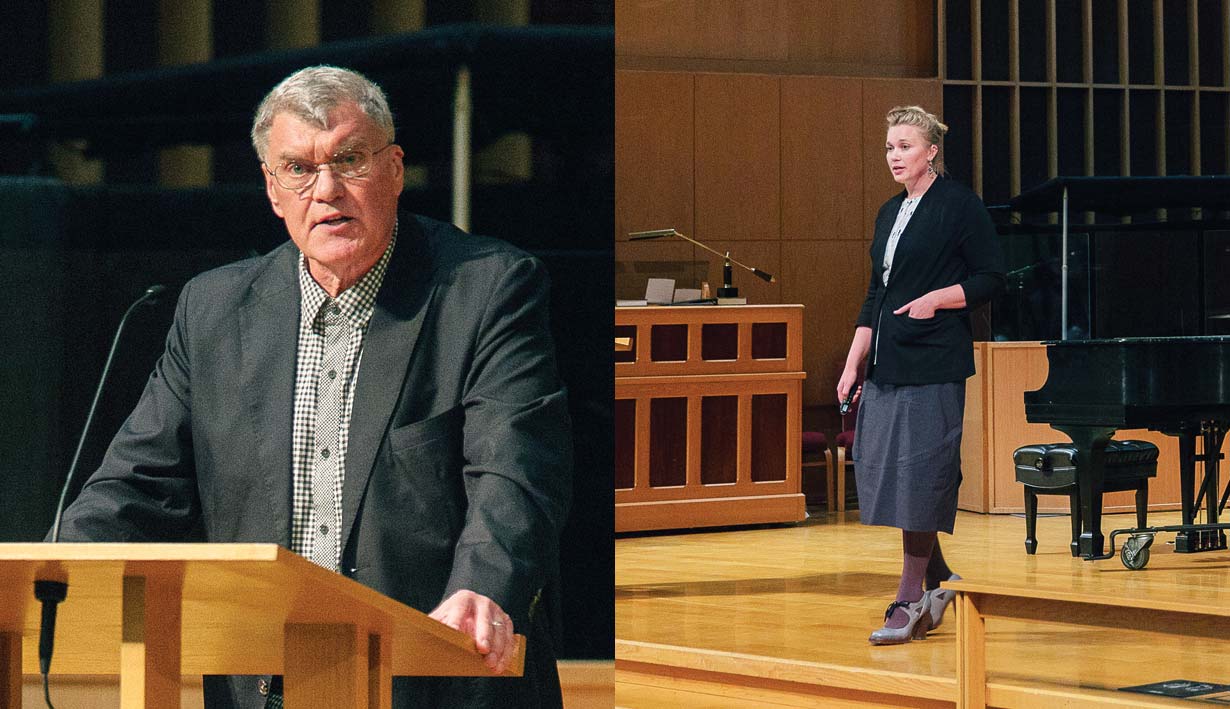The Bible & Theology Toward Christian Maturity
Resurrection Biology?
Father-daughter, theologian-scientist team to explore answers to questions of faith and science
By Jeffrey Overstreet | Photos by Daniel Sheehan
 Left to right: SPU faculty members Rob Wall and Cara Wall-Scheffler spoke to questions of faith and science in First Free Methodist Church, adjacent to the SPU campus.
Left to right: SPU faculty members Rob Wall and Cara Wall-Scheffler spoke to questions of faith and science in First Free Methodist Church, adjacent to the SPU campus.
“What becomes of the human body in heaven? Will it evolve?”
Those questions, raised by a student in a 2014 capstone seminar about John Wesley, intrigued Rob Wall, Seattle Pacific University’s Paul T. Walls Professor of Scripture and Wesleyan Studies.
And eventually, they inspired what became this year’s Paul T. Walls Lecture in Wesleyan Theology: “The Evolution of God’s New Creation,” held May 4, 2016.
Wall, together with Associate Professor of Biology Cara Wall-Scheffler, who is also his daughter, presented what they called “an experiment,” sharing complementary theological and scientific responses to questions of biology raised by the Bible. They were also joined by respondent Randy Maddox, a Wesleyan scholar from Duke Divinity School. The group explored the relationship between discoveries of evolutionary science and what the Scriptures might mean when they say that all things will be “made new.”
Wall reminded listeners that both John Wesley, Methodism’s founder, and B.T. Roberts, the founder of Free Methodism, believed in the harmony between scientific discoveries and Christian doctrines. “Good science is not the enemy of Christian discipleship,” said Wall. “In fact, good science provides plausible explanations of God’s creation that benefit good theology.”
Up next, Wall-Scheffler theorized about “niches,” ecological systems, that might sustain the incorruptible human bodies promised by biblical prophecy. She drew first from Isaiah 65, with its vision of a world without disease; where people enjoy vineyards and fruit; where healthy babies are born, and adults live long lives; where God is present, and where people carry his word in their hearts.
From descriptions of the resurrected Christ, Wall-Scheffler observed that God’s people in the new creation are bipedal, eat food, can be touched, use language, and bear scars or “evidence” of past experiences. But Jesus also appears, disappears, and walks through walls, suggesting the evolution of new ways of being in the world. How could such existence be possible? Wall-Scheffler pointed to tiny seeds that fall but are born again as transformed bodies, bearing their original DNA but becoming something tremendous and new.
Maddox, respondent to their lectures, expressed gratitude for how the previous presentations on faith and science manifested a Wesleyan tradition. “Wesley says to both sides, ‘Be not so sure,” he said. “The truth of God may be infallible, but never our understanding of it.”
This exploration, hosted by SPU’s School of Theology and sponsored by Scholarship and Christianity in Oxford and the Templeton Foundation, continued the next afternoon when the three scholars reunited for “Faith and Science Dialogue in Action,” a question-and-answer session.
Established to provide students with intellectual and spiritual leadership, the Walls Lecture honors Paul T. Walls, a Free Methodist who served for 31 years on SPU’s Board of Trustees.
The event challenged senior physiology major Andrea Bellville: “This lecture gave me an interesting way of integrating science, how I read my Bible, how I think about God, and how I understand who I am as an organism and a creation of God.”
